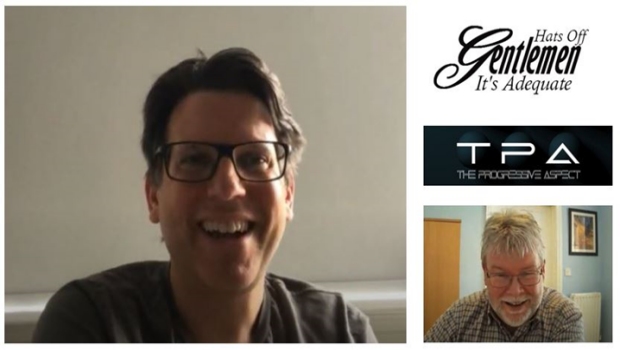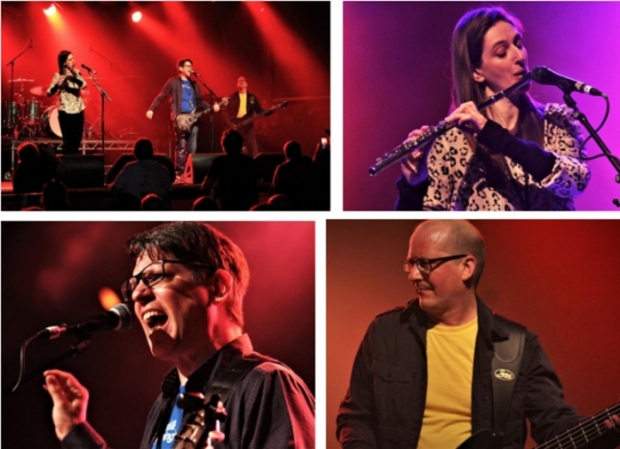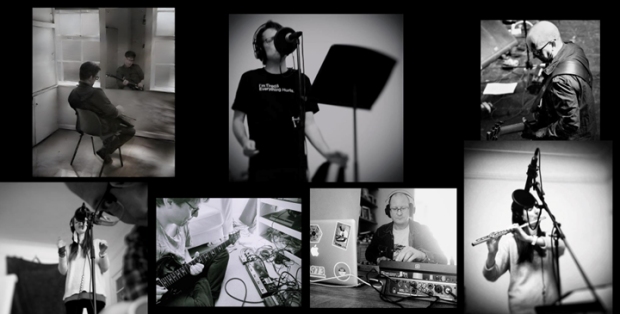In the run-up to the official release of The Confidence Trick by UK progressive rock band Hats Off Gentlemen It’s Adequate, TPA’s David Edwards had the opportunity for an extended chat with the band’s Malcolm Galloway. Speaking remotely from his London home a couple of months before the album’s official release, Malcolm spoke about his musical background, how the band were formed, the latest album and future plans…
Thank you, Malcolm, for taking the time to talk to me about yourself, the band and your impressive new album, The Confidence Trick, which is officially released on 15th July. However, to start off, I wonder if we could talk about how both you and your band, Hat’s Off Gentlemen It’s Adequate, started their musical journey.
So, I started off playing the tuba, that big brass instrument, at school. That was my classical instrument that I could read music for, and I did get to grade 8 level with it. But then I got distracted for a few decades by temporarily becoming a doctor! However, I knew from fairly early on in my medical career that because of a genetic collagen disorder, I wouldn’t be able to do that for the rest of my life.
I’d always been very involved with music, even when I was a medical student, I was reviewing classical music CDs and doing consultancy on contemporary chamber music and bits and pieces like that, but I hadn’t really done that much rock music since being in school bands, where Mark Gatland and I used to play together, jamming in music rooms at school. I was even involved in a hospital pantomime where I had the very prestigious role of Sinbad’s friend! The feedback I got was that I should do more singing – possibly in comparison to the acting, I suppose!
So, I gradually started to do a bit more music myself. I’d taught myself guitar and keyboards during this time and so it was ‘open mic’ nights with an acoustic guitar, and then moving up to feature slots and then support gigs and going to jam nights – whilst writing lots of material as well. I really didn’t see myself as a singer to start with. I started singing my songs because I didn’t have a singer. Maybe partly because I hadn’t had a very rock and roll life as a doctor and a classical music critic to start with, but I initially had doubts about my singing voice. But I do think my voice has steadily improved over the last few decades. I think it took a few years of it being abused with regular gigging before it got more of a ‘rocky’ edge to it and less of the adenoidal choirboy! Nowadays, I think I’ve got a lot more comfortable with singing and I do enjoy performing.
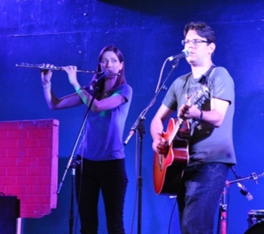 Regarding Hats Off Gentlemen It’s Adequate, I suppose it started off with either me on my own, or with Kathryn Thomas, my wife, on flute. Then Mark came to see one of my solo gigs. While I was having my mis-spent youth of doctoring, he was still very involved in bands and going out and having all this rock and roll lifestyle that I’d been missing. He seemed, I think, to be pleasantly surprised by what I was doing. I don’t think he’d really seen me singing before, as I’d always just been doing other instruments and things. So, he joined up and things developed. For a while we were up to a five piece with a couple of other people, but basically, me and Mark became the core of the band, and it became our creative musical vehicle. Kathryn’s primary interest is classical music, and she has a very busy classical musical career, but she plays when she can, largely to please me, I think – when I get enough emotional blackmail brownie points to get her to come along!
Regarding Hats Off Gentlemen It’s Adequate, I suppose it started off with either me on my own, or with Kathryn Thomas, my wife, on flute. Then Mark came to see one of my solo gigs. While I was having my mis-spent youth of doctoring, he was still very involved in bands and going out and having all this rock and roll lifestyle that I’d been missing. He seemed, I think, to be pleasantly surprised by what I was doing. I don’t think he’d really seen me singing before, as I’d always just been doing other instruments and things. So, he joined up and things developed. For a while we were up to a five piece with a couple of other people, but basically, me and Mark became the core of the band, and it became our creative musical vehicle. Kathryn’s primary interest is classical music, and she has a very busy classical musical career, but she plays when she can, largely to please me, I think – when I get enough emotional blackmail brownie points to get her to come along!
So, as I say, at that stage, it was just basically the two of us. As well as guitars and bass we started doing stuff on the laptop with keyboards and drums. In our studio recordings I do the drums – virtually, I mean. I do have a drum kit, and I can play the drums a bit, but it’s not very practical for me. It’s not great sitting on a drum stool with my spine, so I find it much easier to do it all via the laptop.
 Interestingly, we got asked to play, with the laptop, in 2017 at the HRH Prog festival! It was a very short notice thing where another band had had to pull out due to an injury, and initially I was nervous. Here we are planning to play before really hardcore, ‘real instruments’ people, and I was thinking, “We are going to get lynched, going along with a laptop!” On the train on the way there, we were watching that ‘David Brent’ film where Ricky Gervais’s character from The Office thinks he’s somebody who’s a great singer and songwriter, who puts himself on the road and isn’t very good at all.
Interestingly, we got asked to play, with the laptop, in 2017 at the HRH Prog festival! It was a very short notice thing where another band had had to pull out due to an injury, and initially I was nervous. Here we are planning to play before really hardcore, ‘real instruments’ people, and I was thinking, “We are going to get lynched, going along with a laptop!” On the train on the way there, we were watching that ‘David Brent’ film where Ricky Gervais’s character from The Office thinks he’s somebody who’s a great singer and songwriter, who puts himself on the road and isn’t very good at all.
So, we were watching this on the train on the way to the festival to perform with the likes of Focus, Magnum and Carl Palmer. When we arrived, we assumed we were going to be on the smaller stage. We looked down the list of acts saying, “Oh, no, no, we’re not here! That’s a bit of a shame” – we’d made this big train journey and thought we were having this exciting live opportunity, so we might as well see the other bands at least. Then we realise we are not on this small stage… we were on the main stage instead! So, we opened things up and it was an amazing experience, and so totally out of what I’d previously been used to – which was largely, you know, playing to seven people in a small venue, with most of whom you’d probably dragged along reluctantly! So suddenly playing to a thousand people was very exciting, and we loved it. It was great fun, and I was very pleased by the positive reaction to what’s practical for us to play live.
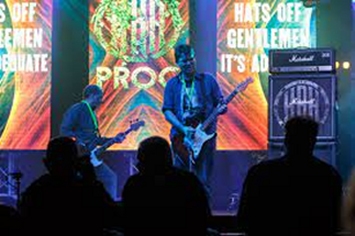 I’m not against real drums. I love real drums. And I like playing drums when I’m able to. But it’s what works physically given my physical challenges. So often people say, “Oh, when are you going to play as a full band with a drummer,” and I do understand that. Normally, we’ve got a drum kit behind us on stage, ready for the next band, so it’s obvious that there’s no drummer, Nobody ever really says to us, “Oh, can you do it with a real keyboard player?” We’ve got keyboards on the laptop, so you don’t seem to notice the actual keyboards being absent. On lots of our tracks we might have 70 or 80 different tracks going on at the same time – hopefully subtly blending together, so it doesn’t just sound too much of a mess.
I’m not against real drums. I love real drums. And I like playing drums when I’m able to. But it’s what works physically given my physical challenges. So often people say, “Oh, when are you going to play as a full band with a drummer,” and I do understand that. Normally, we’ve got a drum kit behind us on stage, ready for the next band, so it’s obvious that there’s no drummer, Nobody ever really says to us, “Oh, can you do it with a real keyboard player?” We’ve got keyboards on the laptop, so you don’t seem to notice the actual keyboards being absent. On lots of our tracks we might have 70 or 80 different tracks going on at the same time – hopefully subtly blending together, so it doesn’t just sound too much of a mess.
Obviously for us, if we tried to do everything without any laptop, it would just be totally unaffordable. It would be lovely to be in the position to do something with a full band, or even an orchestra, and have all the different parts played live, but then my kids would be homeless, and they would probably not approve of that! So, as a band we’ve got to be realistic and practical, and to be fair, it works well for us. I’ve been really pleasantly surprised by how well the music has gone down in a live context. I also think part of the reason is that if we tried to play the music completely live, we’d be so careful and always looking down at our pedal boards or our fingers the whole time and not engaging well with the audience. So, with this additional laptop support as a foundation, we can be really play freely on top of it all.
As a result, I think our live performances are very varied and passionate. I suppose there’s an authenticity to what we do. Everything on those pre-recorded laptop backing tracks is played by us. It’s not like they’re by somebody else – it’s all us! Also, if we play a venue where there’s a piano, I’m happy to do a piano-centred set. Normally we can’t transport keyboards, but I’m pretty flexible in adapting our songs for whatever kind of event or venue we are asked to perform at.
2017 was obviously quite a breakthrough for you from a live point of view and the start of building up a stronger following amongst the prog rock community. However, you had been making studio albums since 2012, starting with Invisible.
That was our first step – 10 years ago now! That album was about invisible disabilities and was related to my experiences with Ehlers-Danlos Syndrome and starting to come to terms with a different life trajectory than I might have originally anticipated. At that stage, we were doing very small-scale gigs, and things have just been gradually building up since then.
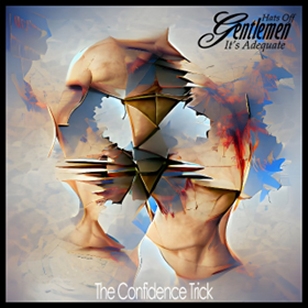 It’s quite clear that you make a lot of effort to ensure that your albums usually have some general theme running through them – often with a sci-fi or scientific storyline. Is that something you enjoy doing with the albums?
It’s quite clear that you make a lot of effort to ensure that your albums usually have some general theme running through them – often with a sci-fi or scientific storyline. Is that something you enjoy doing with the albums?
Yes, I probably would find it quite difficult to do an album where there wasn’t some kind of theme. So When the Kill Code Fails was a sort of science fiction story about artificial intelligence. Then that was followed by Broken But Still Standing, which was about evolution, from the creation of the life in deep sea vents all the way through to post-humanism. Out of Mind looked at aspects of memory, while Nostalgia For Infinity looked at the frailty of civilisation.
I like that even if we haven’t got a single direct story that goes all the way through them, I still like the idea of having a theme and then reflecting on that theme in different ways. Sometimes it’ll be a science fiction story. Stories in a science fiction setting are often a good way to explore something philosophical or historical – but giving the ideas a distance by being set in the future. I also like historical stories. I listen to lots of audio books, and I often think “Right, okay, I think there’s potentially a song in that,” or “Well, I’m really interested in that theme, but I don’t feel I’ve yet got the narrative perspective right for making a song out of that.” So often, for a song, I feel that I need the sense of who the narrator is as the vocalist. So often, our songs relate to a story, but it’s not usually in a traditional folk ballad way. It’s normally about a character and how they feel at a particular point in the story. So, that gives it a kind of emotional connection. That’s something that I look for in a story to turn it into a song – to have that sense of where that character is at. Usually, it’ll be about the character being frustrated, depressed or cross. Unfortunately, the ones that don’t seem to jump out to me are those ones where everything’s fine!
With The Confidence Trick, you’ve taken on board the concepts of overconfidence and cognitive errors, such as excessive confidence and positivity and making the same mistakes again and again. Where did that particular idea come from?
It came from when I was a medical school teacher, and also from my experience of investigating deaths professionally. One of my areas of interest was how and why people make misdiagnoses and medical errors, and one of the themes that I kept bumping into was excessive certainty. You know, you decide what the answer is, and then you just look for evidence to support that and stick with that, regardless of what the later information is. And overconfidence. Yes. This is a really widespread problem. It certainly causes problems in medicine and is a problem in politics and society as a whole.
I mean, if you ask drivers, “Are you a better driver than average?” – about 94% of people think they are. People will actually recognise this flawed overconfidence in people in general but will not think it applies to them. I used to do workshops with doctors, and you’d say to them, “Okay, just confidentially… do you think you’re a better doctor than average in this room, and do you think you are less biased than average in this room?” And generally, most doctors were overconfident rather than under-confident. Even with academics who’ve been asked, “Do you think you’re in the top 10% of academics?” and 90% or so thought they were! So, it’s not even being more educated that protects you from this overconfidence.
Getting regular, accurate feedback can improve this calibration, but overall, society is set up to reward this overconfidence. People assume that the most confident are also the most competent – and obviously if society responds to this confidence and doesn’t get a measure of competence to judge people by, then, in terms of evolution, it makes sense to pretend that you’re a lot more competent than you are. The result ultimately ends up with very confident, often quiet, aggressive and narcissistic leaders.
Many of your songs on the new album evolve out of that general theme, but you also have created a broad sweep of ideas within that framework. How long did it take you to come up with this collage of ideas on the new album?
Well, I suppose I’m always, you know, coming up with ideas and writing songs or bits of songs. In general, the songs were written between about 2019 and 2000, and we finished recording it earlier this year. Most of the songs were written before COVID. Another Plague sounds like is a very COVID-related song, but that was actually written well before the pandemic. So yes, most of it was written before then, except the last track Cygnus. On the whole, the themes are about overconfidence, which is something I’ve been doing research on, and teaching about that in my former academic life for quite a few years. Cognitive errors, leading to mistakes, has been a regular theme in my kind of academic and teaching activity. I used to be a director of a medical education charity, and was interested in how we might address these issues in training programmes. It’s a kind of a big theme for me.
Another Plague is one of the album’s many tracks that impressed me so much, not least because it seemed to echo the COVID experience in an imaginative way, but as you say, it was written before that. You also seem to have captured much of the unease about the invasion of Ukraine and the plight of refugees and the dispossessed in advance.
Although coming out around the time of COVID, it is as much about overconfident dictators, starting wars, and about dehumanisation in general – but it certainly is still relevant. I’m not claiming any kind of prophetic powers, though. When I was a medical school teacher, for years before COVID, I was saying to my students, you know, we are overdue another pandemic. We didn’t know which particular organism it was going to be – but given the way that we treat the environment and start getting a load of wild animals with different group of viruses into regular contact with people, and a highly connected population at that, the chances of not having pandemics is very, very low. It was inevitable. Which is why it’s so frustrating that the preparations for pandemics were so underfunded in many countries.
In terms of the writing process with your albums, how do you and Mark interact creatively? I know Mark provides much of the keyboard layering as well as his bass guitar playing. Is it done remotely, or does he regularly come around to your house when the music is taking shape?
Both Mark and I are very regularly in touch. We do some face-to-face stuff, but in terms of the actual song-writing process, usually I’ll come up with an overall structure and create a framework, almost like a skeleton, to the musical piece at the start. Then he’ll send me various parts, which get incorporated or adapted as necessary. Mark does the bass, some slide guitar and often he uses the Chapman Stick or keyboards to create particular sounds and themes. I write the lyrics. Then after that, when the song is at a more advanced stage, we will get together face-to-face to start to complete it. There will be a lot of computer-looping around one bar and timings of notes, etc., which is often the deeply detailed, obsessive stuff that we work on until we’re happy with that. There’s a lot of sending over audio files between us and we’ll go backwards and forwards. Usually for a track, we’ve ended up getting to version 30 and 140 or so, by the time we think it’s all done!
Then it’s the mixing and mastering to get it exactly right. If you’ve got complex pieces and lots of different layers, when you’re doing the mastering, you also need to be aware of how the music will be heard. How will it sound on the radio rather than on a home system? Quieter bits might sound louder, while louder bits might sound quieter – which will make the song sound different. You notice details and, particularly for me, unfortunately, you notice these little noises in the vocals. You know, the little bits in the background, so you are making fine adjustments. You could go around in cycles and tinker indefinitely, but usually it’s Mark who says, “That’s done – stop!”
The band’s name is quite light-hearted and self-deprecating – conjuring up images of Victorian engineers and scientists lifting up their top hats at the end of some construction or engineering project!
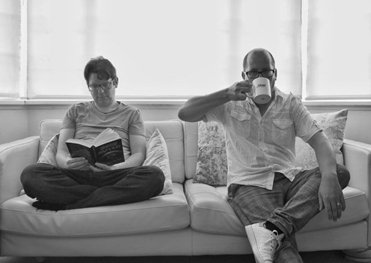 It’s interesting. I don’t think our albums are particularly funny. So, I do think there’s a danger that with the name, people might think we’re a sort of comedy band, which is very much not what we are. My view is that we take the music very seriously, but we don’t take ourselves very seriously. That is hopefully what you see in our gigs. We can hopefully show our humorous and playful side and be able to laugh at ourselves, but then play our music with great intensity and deal with serious ideas – especially in our lyrics.
It’s interesting. I don’t think our albums are particularly funny. So, I do think there’s a danger that with the name, people might think we’re a sort of comedy band, which is very much not what we are. My view is that we take the music very seriously, but we don’t take ourselves very seriously. That is hopefully what you see in our gigs. We can hopefully show our humorous and playful side and be able to laugh at ourselves, but then play our music with great intensity and deal with serious ideas – especially in our lyrics.
Creatively, you remain very busy. You’ve produced some excellent artwork for the new album and, parallel to the band, you continue to pursue your classical, minimalist, solo works. How does all of this activity fit together?
Creatively, I don’t tend to be good with staying with one project for a while, through to a finish, and then move onto the next one. I’ve always got different bits and things to progress. I’ve got another minimalist recording now that’s ready to be released at the moment – but my kids have told me that I shouldn’t do it at the same time as other things. There is a temptation that when I’ve got stuff ready to release, I just want to get it out there and then move on to the next thing. In the latter stages of recording, the problem is that I keep having ideas for future things going through my head, and I’ve got to ignore them while I’m focusing on trying to find some annoying digital click on a track that’s somewhere in the audio mix. I also want to be writing about a new subject, as the part I probably enjoy the most is creating new things.
I think the forthcoming minimalist album, set for release later in the year, will be my sixth album of that kind. If we include the band’s releases, it has been twelve albums since 2012. Twelve albums in ten years is very productive. It’s up to the individual to judge the quality, but in terms of quantity, there’s a lot of it. The classical music I do is all instrumental. It’s much less intimidating, as I’m not hearing my own voice and picking fault with it!
Regarding the artwork, I actually don’t really feel I’m good at art in the sense of if I was asked to draw a face that looks like a face, I’d be rubbish at that. My art is all assisted by computer technology. Pretty much all the songs on the album have got individual pieces of art that go with them that we put in the CD booklet. The starting point has been art that we’ve made with something called Nightcafe Studio, which is artificial, intelligence-assisted artmaking software where you describe what you want to see and then edit and work with it. Then there is the graphic design around making the artwork look like a CD booklet, with the words in the right place. That’s really fiddly, but that’s something that I’ve kind of learnt over time. As you know, our record label is just me and a laptop. I’m fairly comfortable with using Photoshop to make something that looks like an album – but that took a lot of trial and error. For us, the artwork is a fairly integral part of the whole project – especially on the new album, since individual pieces of art that go inside the booklet are really based on the lyrical themes.
The album comes out in about another month or so. The reviews are starting to come in and the pre-orders look encouraging. What are your future plans over the next few months?
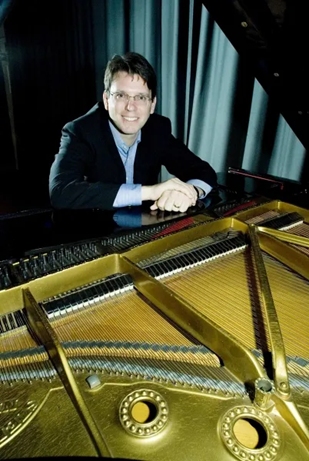 Well, firstly we’ll have a load of CDs to sign and then stuffing envelopes over the next month when they come back from pressing. The master audio has just arrived – so Mark is listening to that this morning. Just a final check that nothing has been messed up at the last minute. It’s nice having our own label and be our own bosses and do what we want. However, on the other hand, there is a lot of very unexciting admin work that goes with it. Lots of sticking labels to envelopes and sitting at computers typing away. So, we’ve got a lot of that to do at the moment.
Well, firstly we’ll have a load of CDs to sign and then stuffing envelopes over the next month when they come back from pressing. The master audio has just arrived – so Mark is listening to that this morning. Just a final check that nothing has been messed up at the last minute. It’s nice having our own label and be our own bosses and do what we want. However, on the other hand, there is a lot of very unexciting admin work that goes with it. Lots of sticking labels to envelopes and sitting at computers typing away. So, we’ve got a lot of that to do at the moment.
I’m trying to suppress the ideas for the next album from my head while I try and concentrate on getting this album finished. But as I’ve said, I’m not very good at that. I do get really easily distracted by thoughts of maybe doing a little bit of new song writing, etc. There are some ideas that are being worked on at the moment, so I very much doubt it will be very long before we start really getting stuck into that. So, I imagine that Mark and I will be sat on a train on the way to a festival or gig in the next few months and will talk through the different album concepts and decide upon one.
I’ve been listening to lots of audio books relating to the Cold War of late, and John Le Carré’s biography, which is the kind of thing that appeals to me. Again, I think that fits in with some of the cognitive error issues of The Confidence Trick, and there’s that kind of world where they’re all leading multiple lives that is just so alien to me. I’ve also, for a number of years now, been doing something about uncertainty from a variety of angles, including the physics side and the human side – which obviously fits very strongly with overconfidence and the excessive certainty side of the self – but it might be better for that not to be the next thing to work on.
There are ongoing live performances as well, whenever you get the opportunity. Bigger festivals mixed with small gigs?
We’ve got a mix of interesting stuff. Tomorrow, I’m doing two acoustic solo sets. One at the Renaissance Alternative Music Festival, which is mostly metal plus me and my acoustic guitar! I think when people see it’s just a middle-aged man and an acoustic guitar, they assume I will be that kind of singer-songwriter artist. But that’s not what I do on my solo gigs. Often, I will play my rockier songs with mostly funky chords and rock riffs, as a change to the twiddly bits on the guitar that I can’t really playing on my own, because I don’t have any chords underneath. Then I’m supporting a Marillion tribute band called Mr Punch at the Underworld on Camden High Street. There’s the Breaking Bands Festival in Bromsgrove next month and, looking further ahead, there is Prog The Forest in Camden in December, which Chris Parkins of London Prog Gigs helps promote. He’s someone who has been important in getting us better known in recent years.
That’s great! Well… just time to say a big thank you for your time and thoughts today. I really hope the new album is the success it deserves to be, and hopefully I’ll be able to see you, Mark and even Kathryn playing live once again in the near future.
Thank you very much.
LINKS
Hats Off Gentlemen It’s Adequate – Website | Facebook | Bandcamp
Images courtesy of Hats Off Gentlemen It’s Adequate, Stan Siarkiewicz and Prog Magazine

